豆蔻 dou kou – White cardamom,cardamom tcm,cardamom herb,cardamom spice,organic cardamom,cardamom price,cardamom seed,cardamom for sale,buy cardamom,cardamom online,cardamom price per kg,White cardamom (attached: cardamom shell, cardamom flower)
[Medicinal Use] The mature fruit of Amonum Kravanh Pirreex Gagnep. or Javanese White Cardamom A. compactum Solandex Maton.
[Nature, flavor and meridians] pungent, warm. Returns to the lung, spleen and stomach meridians.
【Efficacy】Remove dampness, promote qi, warm and stop vomiting.
[Clinical Application] 1. Used for symptoms such as dampness blocking the spleen and stomach, epigastric distension, inability to eat, chest tightness and qi stagnation, and the onset of dampness and warmth.
White cardamom has a fragrant smell, is pungent and warm, and has the function of dispersing dampness and awakening the spleen. It can also promote qi and has a good effect on dampness-blocked qi stagnation. It can be used equally with Atractylodes, Pinellia ternata, and tangerine peel. This product has clear and floating Qi, can enter the lung meridian, and can also be used for symptoms of Qi stagnation and chest tightness. It can be used with Magnolia officinalis and Citrus aurantium. In addition, it can also be used for the initial onset of dampness and heat. For those with severe heat, it can be used with skullcap, forsythia, bamboo leaves, etc.; for those with heavy dampness, it can be used with products that lighten the moisture and diuretic, such as talc, Yiren, Tongcao, etc.
2. Used for nausea and vomiting.
White cardamom can warm the body and dispel cold, and has anti-vomiting effect. It is used to treat stomach cold and vomiting. It is often used in combination with pinellia, rugosa, and ginger. To treat stomach cold and vomiting of milk in children, it can be mixed with amomum villosum and licorice, grind into fine powder, and often ooze into the mouth.
[Prescription name] white cardamom, cardamom, purple cardamom (with shell, for breaking)
[General dosage and usage] One to two qian, it should be taken after adding to the decoction.
[Additional medicine] 1. Cardamom shell: the shell of white cardamom. The functional properties are the same as those of cardamom, but the warmth is slightly reduced and the potency is also weaker. It is suitable for symptoms such as cold-damp qi stagnation, epigastric distention, stomach dullness, and vomiting. The general dosage is 1 to 2 qian, decoction and taken.
2. Cardamom flower: the dried flower of white cardamom. The function and dosage are the same as cardamom shell.
[Notes] 1. White cardamom is pungent and warm but not hot, fragrant and clear. It enters the lung meridian to relieve stagnation and widen the chest. It enters the spleen and stomach to remove dampness and promote qi. It is warm and can stop vomiting. It is caused by cold damp qi stagnation in the middle and upper burners. Ask for medicine.
2. Amomum villosum and white cardamom have the same nature and flavor. They both enter the spleen and stomach, and both have the effect of resolving dampness, awakening the spleen, and promoting qi. However, amomum villosum is fragrant but turbid, can warm the middle and stop diarrhea, and enters the kidney meridian, so it is suitable for the middle and lower areas. The two cold dampness qi stagnation still has anti-fetal effect; white cardamom is fragrant and clear, can warm and stop vomiting, and enters the lung meridian, which is suitable for the symptoms of cold dampness stagnation in the middle and upper two burners.
[Examples of prescriptions] White cardamom soup (“Shen’s Zunsheng”): white cardamom, patchouli, tangerine peel, and ginger. Treat nausea and vomiting.
[Excerpt from literature] “Kaibao Materia Medica”: “It is mainly responsible for accumulating cold air, stopping vomiting and nausea, and eliminating grain and lowering qi.”
“Medical Origins”: “The “Secret Treatment of Indications” states that Fei Jin is a medicine that can disperse stagnant Qi in the chest, cause cold and abdominal pain, warm the spleen and stomach, and treat red eyes, red eyes, etc.”
“Compendium of Materia Medica”: “It is mainly responsible for the accumulation of cold air and injury, vomiting, and nausea due to cold. Warmth can eliminate things, so it has the main function of eliminating grains; warm energy can circulate, so it has the main function of lowering Qi. Dongyuan is used to disperse stagnant Qi in the lungs. Eating with a wide diaphragm can remove the white eye membrane and relieve stagnation.”
“Yuqiao Medicine Explanation”: “It is best for dispelling turbidity on the diaphragm, and is extremely effective in treating nausea and vomiting. Chewing it is pungent and cool, clearing the lungs, and relieving depression and irritation in time.”
“Compendium of Materia Medica Seeking Truth”: “It is of the same type as Shui Sha Mi. The smell is the same and the function is indistinguishable. However, there is another refreshing and wonderful Qi, which goes up to the lung meridian and becomes the main medicine for dispersing Qi in the Fei family; it has a pungent, warm and fragrant aroma. Channeling, popularizing triple burner, warms the spleen and stomach,…it is not like Shusha, dense, pungent, warm, fragrant, channeling and bitter. It is specially used to harmonize the stomach, awaken the spleen and regulate the central nervous system, and it also affects other parts of the lungs and kidneys.”
This product is from Meicun plant. Amomum kravanh Pierre is divided into “original cardamom” and “Indonesian white cardamom”.
Ex Gaqnep. or the dried ripe fruit of Javanese white cardamom Amomum compactum Soland ex Maton.
Different by place of origin
【Tính cách】
Raw cardamom is spherical in shape, with a diameter of 1.2~1.8cm. The surface is yellow-white to light yellow-brown, with three deep longitudinal grooves, a raised plinth at the top, a concave stem mark at the base, and light brown hairs at both ends. The peel is light, brittle, and easy to split longitudinally. It is divided into 3 compartments, each compartment containing about 10 seeds; the seeds are irregular polyhedral, slightly raised on the back, 3~4mm in diameter, dark brown on the surface, wrinkled, and covered with Residual arils. The aroma is fragrant and the taste is pungent and cool, slightly like camphor.
Indonesian White Kumquat is slightly smaller. The surface is yellow-white, and some are slightly purple-brown. The peel is thin and the seeds are skinny. The smell is weak. 【Identification】
(1) The powder of this product is grayish brown to brown. The epidermal cells of the seed coat are light yellow, elongated in surface view, and often arranged vertically with the upper and lower layers of the hypodermal cells. The hypodermal cells contain brown or reddish-brown material. The cells of the pigment layer are mostly shriveled and contain dark reddish-brown matter. The oil cells are round or oblong and contain yellow-green oil droplets. The inner testa thick-walled cells are yellow-brown, red-brown or dark brown, polygonal in appearance, thick-walled, and contain siliceous blocks in the cell cavity. The cross-sectional view shows a row of grid-like cells. The outer endosperm cells are rectangular or irregular in shape, filled with starch clusters formed by the accumulation of small starch granules, and some contain small calcium oxalate square crystals.
(2) According to the thin layer chromatography (General Chapter 0502) test, draw (content determination) 104l each of the test solution and the reference solution under the calibration oil, and place them on the same silica gel G thin layer plate respectively. Use alkyl chloride-ethyl acetate (15:5:0.5) as a developing agent, unfold, take out, dry, spray with 5% vanilla sulfuric acid solution, heat at 105°C until the spots become clear, and inspect the test sample immediately. In the chromatogram, spots of the same color appear at positions corresponding to the chromatogram of the reference substance.
【nghiên cứu】
Impurities: raw cardamom must not exceed 1%; Indonesian white cardamom must not exceed 2% (General Rule 2301).
Moisture content: raw cardamom must not exceed 11.0%; Indonesian white cardamom must not exceed 12.0% (Method 4 of General Regulation 0832) [Content Determination]
Volatile oil: Take an appropriate amount of cardamom kernels, mash them and weigh 30~50g, and measure according to the volatile oil determination method (General Chapter 2204).
The volatile oil content of raw cardamom kernels shall not be less than 5.0% (ml/g); the volatile oil content of Indonesian white cardamom kernels shall not be less than 4.0% (ml/g).
Eucalyptol is determined according to gas chromatography (General Chapter 0521).
Chromatographic conditions and system suitability test Methyl clam rubber (SE-54) was used as the stationary phase. Coating concentration 10%: Gui temperature 110℃, the number of theoretical plates should not be less than 1000 according to the olein peak. Preparation of the reference solution. Take an appropriate amount of eucalyptus reference substance, weigh it accurately, add n-hexane to make each 1ml A solution containing 25mg is ready. Preparation of test solution: Take about 5g of cardamom kernel powder (passed through No. 3 sieve), weigh it accurately, place it in a round-bottomed flask, add 200ml of water, connect the volatile oil meter, add water from the upper end of the meter to the mark of 3ml, and then add n-hexane 2 ~3ml, connect the reflux condenser, heat to slightly boiling, and keep it for 2 hours, let it cool, separate out the n-hexane liquid, filter it through a funnel covered with about 1g of anhydrous sodium sulfate, put the filtrate into a 5ml measuring bottle, and add volatile oil Wash the inner wall of the measuring device with a small amount of n-hexane, put the washing liquid into the same measuring bottle, dilute it to the mark with n-hexane, shake it well, filter it, and take the filtrate to get it. 5. Precisely absorb 1u each of the reference solution and the test solution, inject them into the gas chromatograph, and measure. Determination method: Calculated as dry product, cardamom kernels contain no less than 3.0% eucalyptol (C10H180).
Đồ uống
[Đã xử lý]
Remove impurities. Mash when used.
[Character] [Identification] [Inspection] [Content Determination]
Cùng một loại dược liệu.
【Thiên nhiên, hương vị và hướng kinh lạc】
Pungent, warm. Returns to the lung, spleen and stomach meridians.
[Chức năng và chỉ định]
Removing dampness and promoting Qi, warming and stopping vomiting, appetizing and digesting. It is used for damp and turbid obstruction, no desire to eat, initial onset of dampness and warmth, chest tightness without hunger, cold-damp vomiting, chest and abdominal distension and pain, and persistent food accumulation.
【Cách dùng và liều dùng】
3~6g, lower down.
【Kho】
Sealed, placed in a cool, dry place to prevent moth.
Where is the main origin of cardamom?
The original cardamom is mainly produced in Thailand and Cambodia; the Indonesian white cardamom is mainly produced in Java, Indonesia, and is also cultivated in Yunnan, Guangdong, Guangxi and other places in my country.
Where are the main medicinal parts of cardamom?
Cardamom medicinal parts:
The dried ripe fruit of Amomum kravanh Pierre ex Gagnep. or Amomum compactum Soland ex Maton from the ginger plant. According to different origins, it is divided into “original cardamom” and “Indonesian white cardamom”.
Characteristics of the medicinal parts of cardamom:
Raw cardamom is spherical in shape, with a diameter of 1.2~1.8cm. The surface is yellow-white to light yellow-brown, with three deep longitudinal grooves, a raised plinth at the top and a concave stem mark at the base, and light brown hairs on both ends.
The peel is light, brittle, and easy to split longitudinally. It is divided into 3 compartments, each compartment containing about 10 seeds; the seeds are irregular polyhedral, slightly raised on the back, 3~4mm in diameter, dark brown on the surface, wrinkled, and covered with Residual arils.
The aroma is fragrant and the taste is pungent and cool, slightly like camphor. The Indonesian white komong is slightly smaller. The surface is yellow-white, and some are slightly purple-brown. The peel is thin and the seeds are skinny. The smell is weak.
How is cardamom recorded in ancient historical books?
“Gianbao Materia Medica”: “It is mainly responsible for accumulating cold air, stopping vomiting and regurgitation, and eliminating grain and lowering qi.”
“Materia Medica Mengquan”: “Disperses the cold stagnation in the chest and benefits the yang in the diaphragm. Warms the spleen and earth but hurts, retreats the clouds and removes obstructions in the eyes. Stops stomach upset and vomiting, and eliminates food bloating.”
“Compendium of Materia Medica”: “White cardamom is mainly responsible for the accumulation of cold air and cold vomiting, which is nausea due to cold. It can warm the body and eliminate food, so it can also help eliminate grains; it can warm and circulate, so it can lower the qi. Dongyuan is used to disperse stagnation in the lungs. Qi, widen the diaphragm and eat, remove white eye membrane, and disperse stagnation.
Chức năng và hiệu quả
Cardamom has the effects of reducing dampness and promoting qi, warming and stopping vomiting, appetizing and digesting food.
What are the main effects and clinical applications of cardamom?
Cardamom is used for dampness and turbidity, inability to eat or drink, initial onset of dampness and warmth, chest tightness without hunger, cold-dampness and vomiting, chest and abdominal distension and pain, and food accumulation that cannot be eliminated.
Dampness and Qi stagnation syndrome
It can be used to treat dampness-induced stagnation, fullness of the bladder and abdomen, and indigestion due to food accumulation. It is often used with Patchouli, Peilan, and Tangerine Peel.
It is often used together with astragalus, atractylodes, and ginseng to treat chest and abdominal distention due to spleen deficiency, dampness, and qi stagnation, as well as lack of appetite and weakness.
The beginning of humidity and temperature
·If dampness is severe, it should be used with almond and Magnolia officinalis;
·If the heat is heavier than the dampness, it should be used equally with skullcap, talc, and poria bark.
Vomit
To treat vomiting caused by cold-dampness in the stomach and qi stagnation, it can be taken alone or combined with patchouli, pinellia, and tangerine peel. .
To treat stomach cold in children who vomit milk and refuse to eat, it can be mixed with amomum villosum, licorice and other medicines before being taken.
What other benefits does cardamom have?
In my country’s traditional food culture, some Chinese medicinal materials are often widely eaten as food ingredients among the people, that is, substances that are both food and Chinese medicinal materials according to tradition (i.e., edible medicinal substances). According to documents issued by the National Health Commission and the State Administration for Market Regulation, cardamom can be used as both medicine and food within a limited range of use and dosage.
Commonly used medicinal recipes for cardamom are as follows:
Vomiting, stomach pain
10g of white cardamom kernels are used as powder, and the wine is served.
Exogenous cold, vomiting and diarrhea
6g each of patchouli and simmered ginger, 3g each of parsnips and white cardamom, decoct in water, filter the juice and remove the residue; add 100g of japonica rice, appropriate amount of water, and cook into porridge. Take the porridge while it is hot, preferably if you are slightly sweating.
Cold-damp diarrhea
4.5g each of dried ginger and galangal, 3g white cardamom, decoct in water, filter the juice and remove the residue, add 30g Huiyiren, 60g japonica rice and an appropriate amount of water, and cook together into porridge. Take 2 times a day.
What are the compound preparations containing cardamom?
Canh Sanren
It has the effect of clearing away dampness and heat. Mainly used to treat the onset of dampness-warmth and the syndrome of dampness heavier than heat caused by summer heat and dampness. Headache, aversion to cold, body weight pain, tiredness of limbs, pale complexion, chest tightness and lack of hunger.
Súp bột talc Scutellaria
Clear away heat and promote dampness. Indications: Damp-warm evil in the middle burner, causing fever and body pain, sweating, heat relief, and then relapse of fever, thirst, not drinking much, or no thirst at all
Modern research progress on cardamom
This product has various pharmacological effects such as promoting gastric juice secretion, increasing gastrointestinal motility, stopping vomiting, and relieving alcoholism.
Cách sử dụng
Cardamom has the effects of reducing dampness and promoting qi, warming and stopping vomiting, appetizing and digesting food. Generally, cardamom tablets are used and decoction is taken. Please follow your doctor’s instructions for specific medication.
How to use cardamom correctly?
When cardamom decoction is taken orally, the usual dosage is 3~6g.
Note: When decoction, cardamom should be broken into pieces, that is, other medicines should be decoctioned for a period of time before adding cardamom. Cardamom is usually taken in decoction or decoction. It can also be made into powder or pills. However, the use of Chinese medicinal materials requires syndrome differentiation and treatment, and should be used under the guidance of professional Chinese medicine practitioners. They should not be used at will, let alone listen to traditional Chinese medicine prescriptions and advertisements. In addition, cardamom can also be used for daily health care. Commonly used methods of consumption are as follows:
·Grind into powder and take it: 10g of white cardamom, grind it into powder and take it with wine. It has a therapeutic effect on vomiting and stomachache.
Porridge: 4.5g each of dried ginger and galangal, 3g white cardamom, 30g Huiyiren, and 60g japonica rice. Make porridge and eat it. It has a therapeutic effect on cold-damp diarrhea. .
How to prepare cardamom?
·White cardamom: Currently, take the original medicinal materials, remove impurities, and sift away the dust. Crush it when used,
·White cardamom kernels: Take clean white cardamom kernels, remove impurities and husks, and remove the kernels. Mash when used.
White cardamom skin (shell): Take clean white cardamom, remove impurities, peel off the peel, and sift away the ash.
Which drugs require special attention when using cardamom at the same time?
Việc kết hợp sử dụng y học cổ truyền Trung Quốc và y học Trung Quốc và phương Tây đòi hỏi phải phân biệt hội chứng và điều trị lâm sàng riêng biệt.
Nếu bạn đang dùng thuốc khác, vui lòng tham khảo ý kiến bác sĩ trước khi dùng những loại thuốc này và thông báo cho bác sĩ về tất cả các tình trạng bệnh lý đã được chẩn đoán và phương pháp điều trị mà bạn đang áp dụng.
Hướng dẫn dùng thuốc
Cardamom has a pungent aroma and is warm and drying, so it should not be taken by those who feel nauseated due to excessive heat.
What are the precautions when using cardamom?
. The power of warmth and dryness is strong and it is easy to consume body fluids. It should not be taken by those with yin deficiency, dryness of blood, and insufficient yin and blood without cold and damp stagnation.
Pregnant women or postpartum people without cold-damp syndrome should not take it.
·During the medication, please pay attention to avoid eating cold, cold, spicy, and greasy foods.
·Trẻ em: Việc dùng thuốc cho trẻ em phải được thực hiện dưới sự hướng dẫn của bác sĩ và sự giám sát của người lớn.
·Vui lòng bảo quản dược liệu đúng cách và không đưa dược liệu bạn đang sử dụng cho người khác.
How to identify cardamom?
Cardamom and cardamom shells
Cardamom is a dehumidification medicine. It is the dried and mature fruit of the ginger plant Amomum kravanh Pierre ex Gagnep. or Javanese white cardamom Amomum.compactum Soland ex Maton. Cardamom is pungent and warm in nature and flavor. Returns to the lung, spleen and stomach meridians. It has the effects of removing dampness and promoting qi, warming and stopping vomiting, appetizing and digesting. It is used for damp and turbid obstruction, no desire to eat, initial onset of dampness and warmth, chest tightness without hunger, cold-damp vomiting, chest and abdominal distension and pain, and persistent food accumulation.
Cardamom shell: This product is the shell of the herbaceous plant Amomum kravanh Pierre ex Gagnep. or Amomumcompactum Soland ex Maton. Its properties, taste and effects are similar to those of cardamom, but it is not as warm and weak in potency. It is suitable for epigastric and abdominal distension, loss of appetite, vomiting, etc. caused by stagnation of spleen and stomach dampness and yang qi. Decoct and take, 3~6g.
cardamom and nutmeg
·Both of them have the effects of warming the body, promoting qi and relieving vomiting, and are used for vomiting due to cold stomach and qi stagnation.
·But white cardamom is pungent and warm, and acts on the middle and upper burners. It mainly removes dampness and promotes qi. It is used for epigastric distension, inability to eat, etc. due to dampness stagnation in the middle burner and spleen and stomach qi stagnation.
Nutmeg is pungent and warm, and acts on the middle and lower burners. It can not only astringe the intestines and stop diarrhea, but also warm the middle and warm the spleen. It is mostly used for chronic diarrhea due to kidney deficiency and cold.
Nutmeg has a pungent aroma and is warm and dry. It also has the effect of warming the middle, promoting qi and relieving pain. It is used for stomach cold and qi stagnation, stomach cold and distension and pain, and vomiting due to lack of food.
Mẹo dùng thuốc
Những câu hỏi thường gặp nhất của bệnh nhân
The benefits and functions of nutmeg
Nutmeg is the mature seed kernel of Myristica fragrans Houtt, a plant of the Myristicaceae family.
It has the effects of astringent intestines, antidiarrheal, warming and promoting qi. It mainly treats spleen and stomach deficiency and cold, chronic diarrhea and dysentery, cold and distended stomach pain, vomiting due to lack of food, etc.
Nutmeg side effects
Myristyl ether has hallucinogenic effects on normal humans. It has a moderate stimulating effect on the human brain. When poisoned, in mild cases, hallucinations, nausea, and dizziness may occur; In severe cases, delirium, coma, dilated pupils, slowed breathing, loss of reflexes, and even death may occur. Nutmeg without processing to remove oil or excessive use can cause poisoning. Raw nutmeg is generally not suitable. Myristic ether is teratogenic, and safrole is paralytic and carcinogenic.
豆蔻 Dou Kou – White Cardamom
Khoảng giá: từ $58.88 đến $32,666.00
+ Miễn phí vận chuyểnCardamom, [dou kou], Chinese herbal medicine, alias: white cardamom, round cardamom, original cardamom, buckle rice, English name: Amomi Fructus Rotundus, main effects: dehumidification and qi circulation, warming the middle and stopping vomiting, appetizing and digesting food
Chinese herbal medicine cardamom is a dehumidification medicine, which is the dried mature fruit of white cardamom or Java white cardamom of the ginger family
Cardamom is pungent and warm. It enters the lung, spleen and stomach meridians.
Cardamom is pungent and can disperse, aromatic and warm, and enters the lung, spleen and stomach meridians. It is good at awakening the spleen to eliminate dampness, promote qi circulation, warm the middle, regulate the qi mechanism of the middle and upper Jiao and stop vomiting, widen the chest, and is commonly used to treat dampness blocking the middle Jiao, spleen and stomach qi stagnation, stomach cold vomiting, and can be used to treat dampness blocking chest tightness.
This product contains volatile oils: eucalyptol (1,8-cineole), B-pinene, a-pinene, cloves, bornyl acetate and other ingredients. It has the effects of removing dampness, promoting qi, warming the middle-Jia, stopping vomiting, and stimulating appetite and digestion.
| Cân nặng | 1kg, 10kg, 100kg, 500kg, 1000kg |
|---|


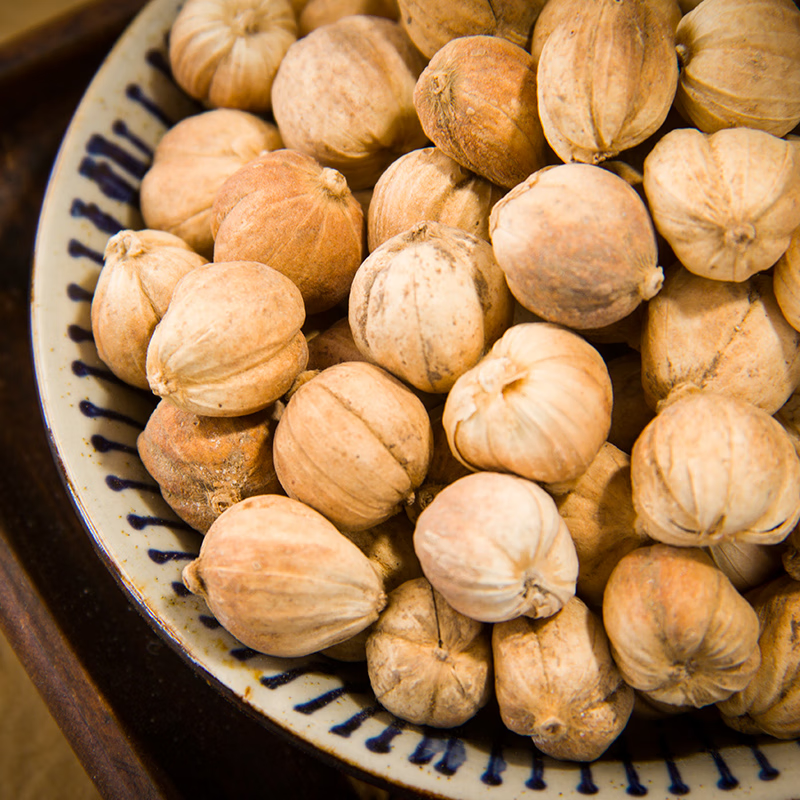



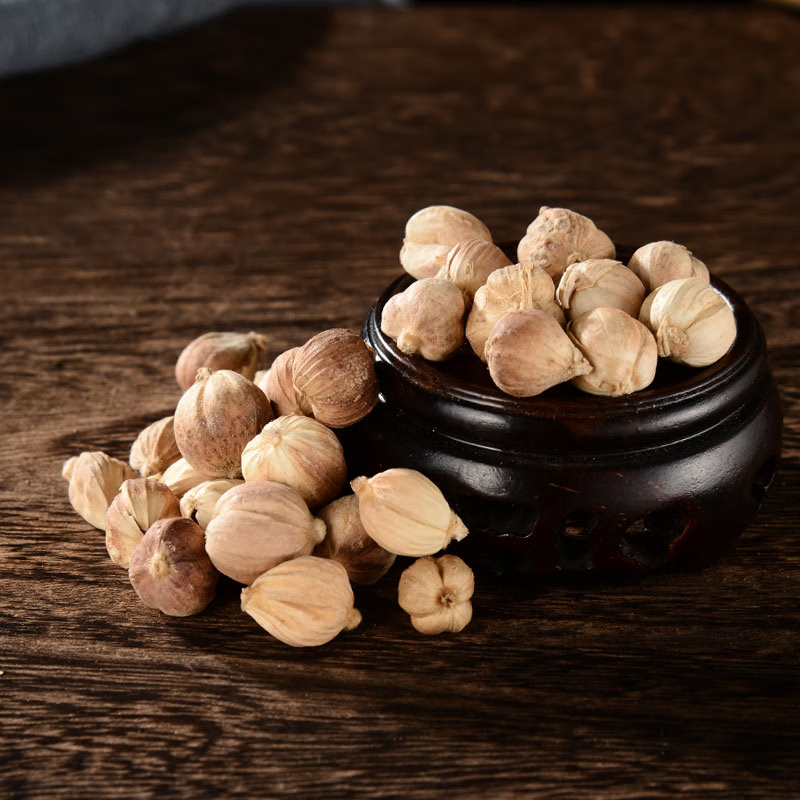


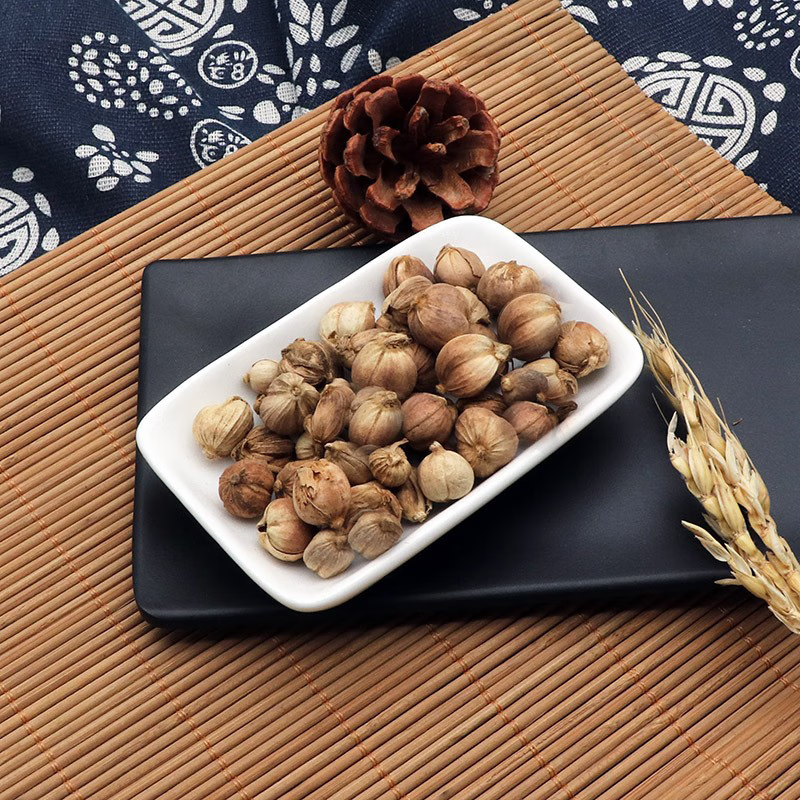

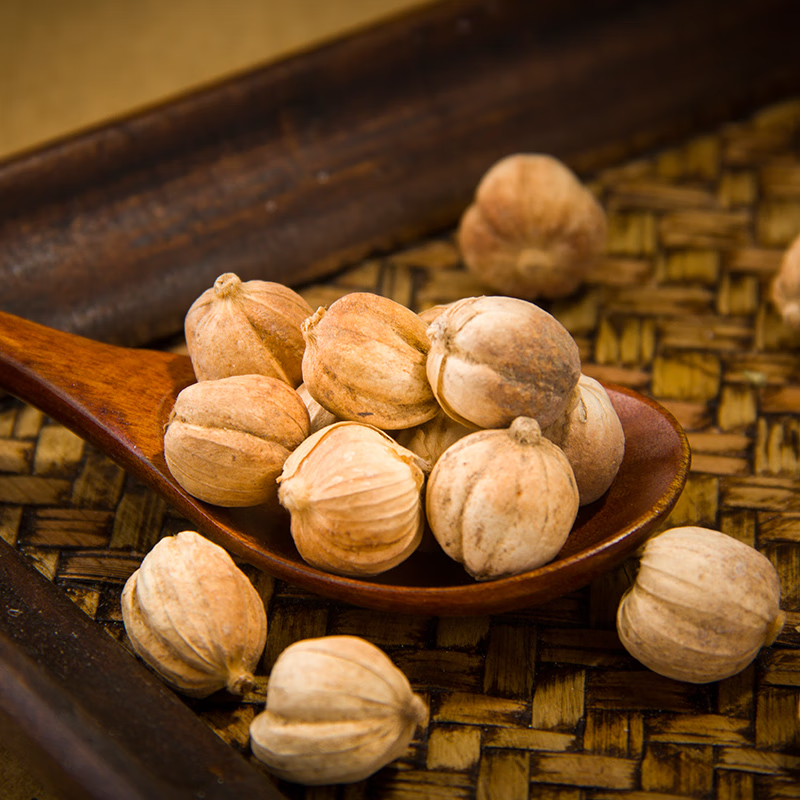
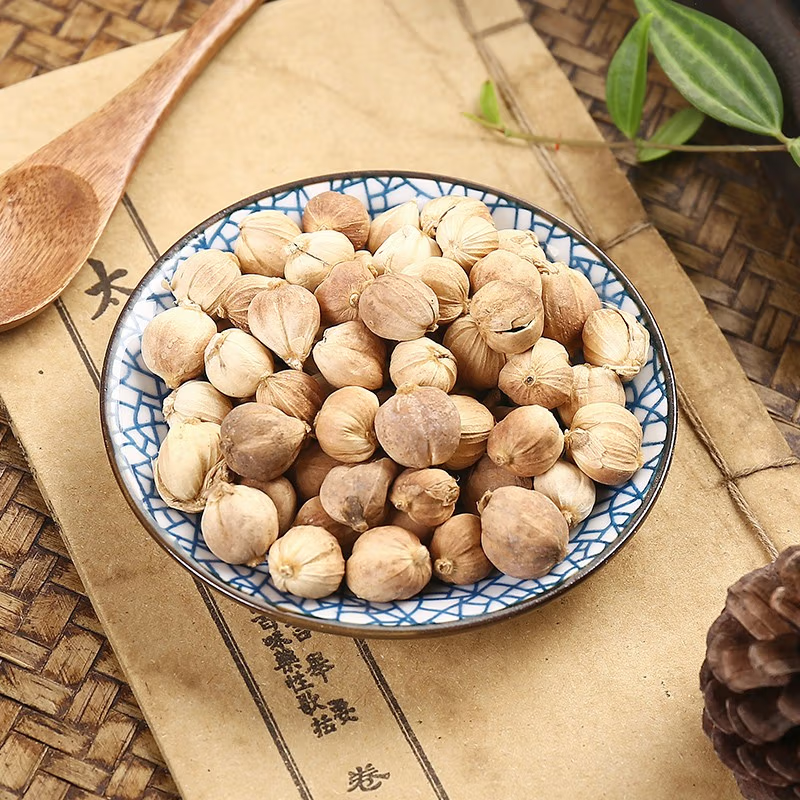
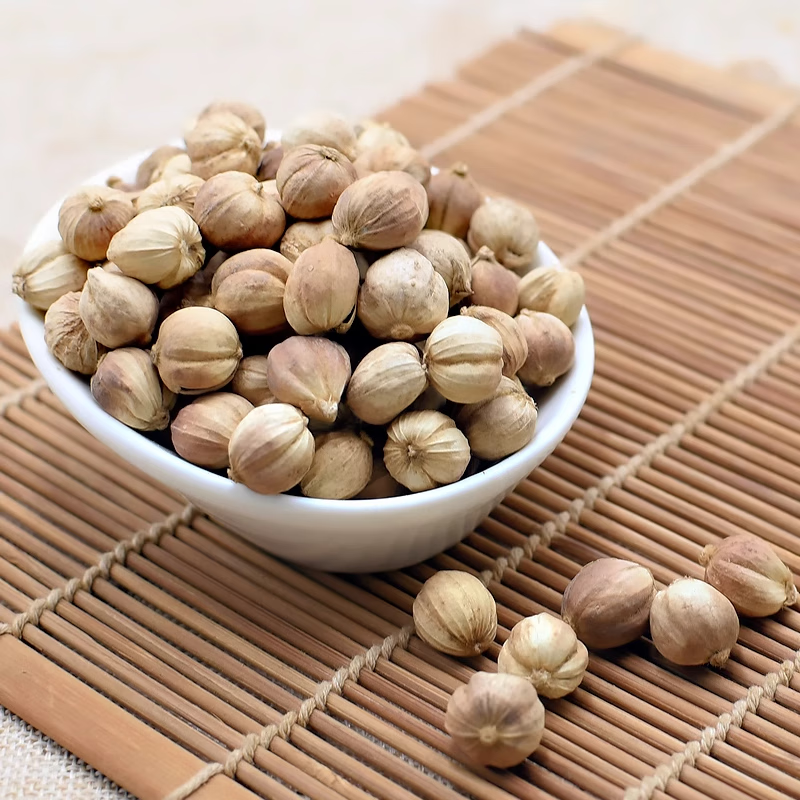





Đánh giá
Hiện tại không có đánh giá nào.